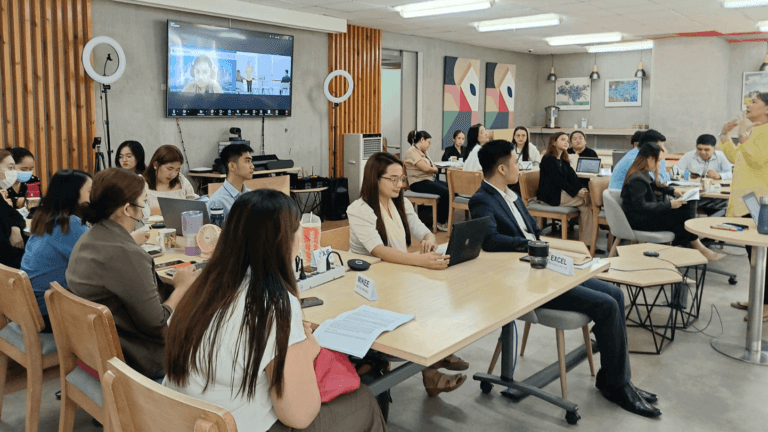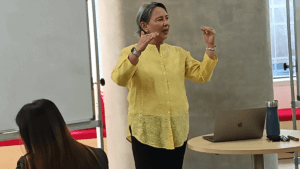On March 6, 2025, we held the seventh session of the Breakthrough Development Program. This session focused on Feedback Essentials and was designed to equip participants with the tools and techniques needed to give and receive constructive feedback effectively in the workplace. We examined the case study “3DP Incorporated (A): Patrick Guten,” emphasizing how feedback can drive leadership development and organizational growth, while also highlighting the challenges that arise when feedback is not communicated or acted upon properly.
Essential Role of Feedback in the Workplace
Feedback plays a central role in personal and professional growth, offering individuals insights into their strengths and areas for improvement. When delivered constructively, it serves as a guide for refining skills and achieving higher performance standards. Regular feedback helps employees stay aligned with organizational goals, ensuring that they remain focused and motivated.
Beyond individual growth, feedback is instrumental in improving team dynamics. It helps identify and resolve communication issues, fosters collaboration, and ensures that everyone is on the same page. Constructive feedback also contributes to creating a workplace culture where employees feel valued, supported, and encouraged to contribute to the team’s success. A feedback-rich environment empowers teams to thrive by continuously improving both individual and collective performance.
How Constructive Feedback Transformed Team Dynamics at 3DP Incorporated
3DP Incorporated cultivates a culture of transparency and ongoing development. Senior manager Patrick Guten utilized constructive feedback to address team conflicts, prioritizing clarity and collaboration over blame. His approach not only resolved miscommunication but also empowered team members, enhancing teamwork, efficiency, and overall project success. As a result of his success, Patrick was offered the opportunity to lead 3DP Innovation, a new division focused on research and prototyping. Though the role required an 18-month relocation to Waterloo, he accepted, viewing it as a step toward a senior leadership position.
Our facilitator, Dr. Grace, highlighted how Patrick’s leadership demonstrated the impact of constructive feedback in driving improvement, accountability, and innovation. By emphasizing solutions over criticism, he fostered a more cohesive team and enhanced overall performance. Participants were highly engaged throughout the session, actively discussing the case and its impact on effective leadership.
Effective Feedback: How to Give and Receive Feedback
Dr. Grace shared key strategies for giving effective feedback, emphasizing the importance of being specific. Rather than offering broad feedback, it’s more effective to focus on specific behaviors. She also introduced the Situation-Behavior-Impact (SBI) Model, which helps structure feedback by describing the situation, detailing the behavior, and explaining the impact it had.
In addition, Dr. Grace introduced the Johari Window, a model that enhances self-awareness through feedback. It consists of four areas: Arena, Blind Spot, Facade, and Unknown. The model encourages expanding the “Arena” by addressing hidden or unknown traits, which improves communication and strengthens team dynamics.
Feedback for Team Improvement
Feedback is not only crucial for individual performance but also for optimizing team performance. By aligning on goals and providing constructive feedback, teams can improve collaboration and efficiency. Feedback sessions allow teams to understand each member’s strengths and areas for growth, helping everyone work towards common objectives.
Furthermore, feedback fosters a culture of trust and transparency, where team members feel comfortable discussing challenges and sharing ideas. When feedback is regularly integrated into team processes, it enables teams to adapt quickly, make improvements, and avoid the stagnation that can occur in a feedback-deprived environment. This continuous cycle of feedback-driven improvement is key to achieving long-term success as a team.
What We Learned
- I’ve learned that constructive feedback drives growth. Effective feedback fosters personal and professional development, improving both individual and team performance.
- I realized how feedback strengthens team dynamics. Open and constructive communication resolves conflicts, enhances collaboration, and boosts efficiency.
- The session showed me that feedback fuels leadership development. Patrick Guten’s case demonstrated how feedback empowers individuals and can lead to career advancement but can also lead to misinterpretation if not delivered effectively.
- I’ve discovered the importance of practical feedback models. The SBI (Situation-Behavior-Impact) Model and Johari Window enhance self-awareness, trust, and clarity in communication.
Enhance Workplace Growth with Constructive Feedback
Effective feedback drives teamwork, leadership, and success. At John Clements Consultants, we help businesses build strong, high-performing teams through expert recruitment and training solutions. Ready to foster a feedback-driven workplace? Contact us today.








